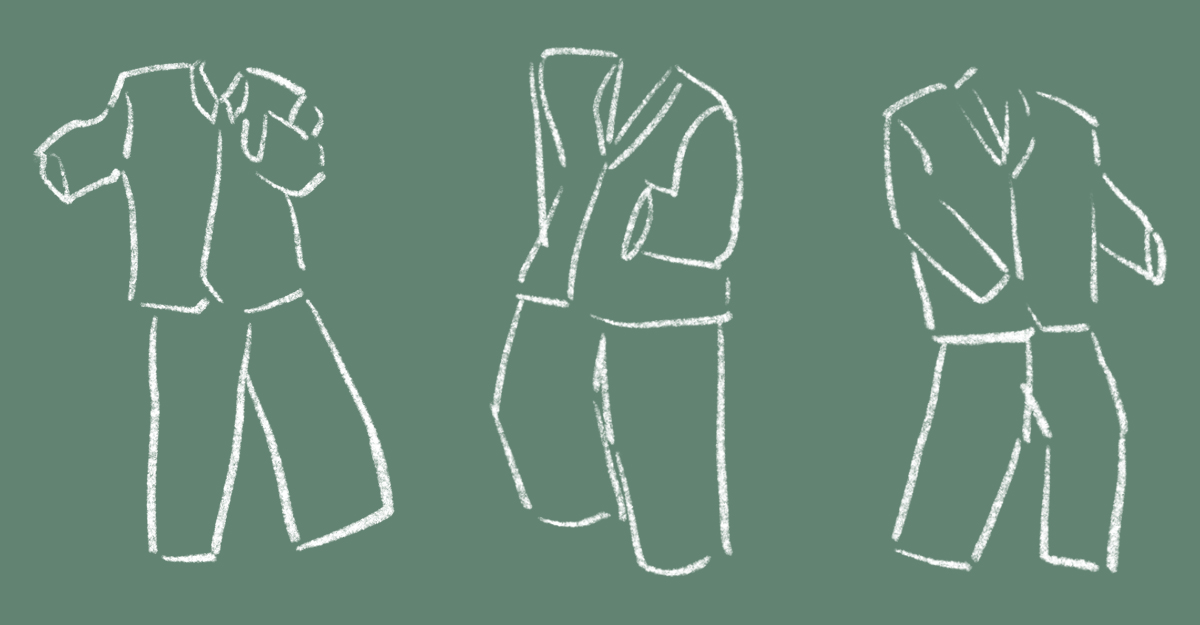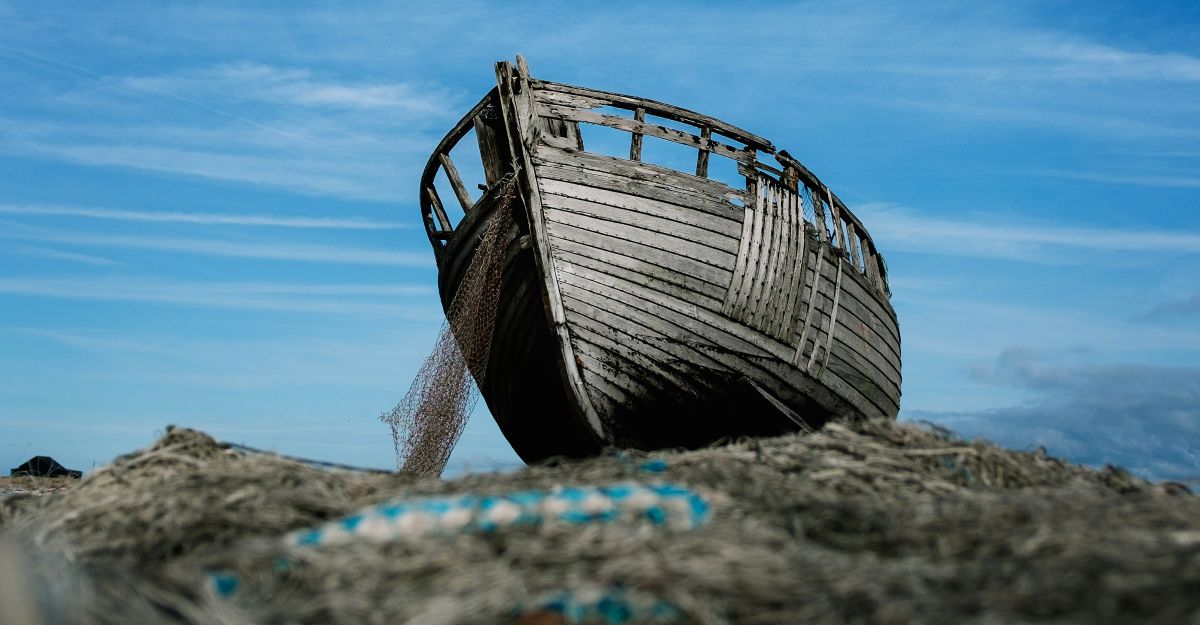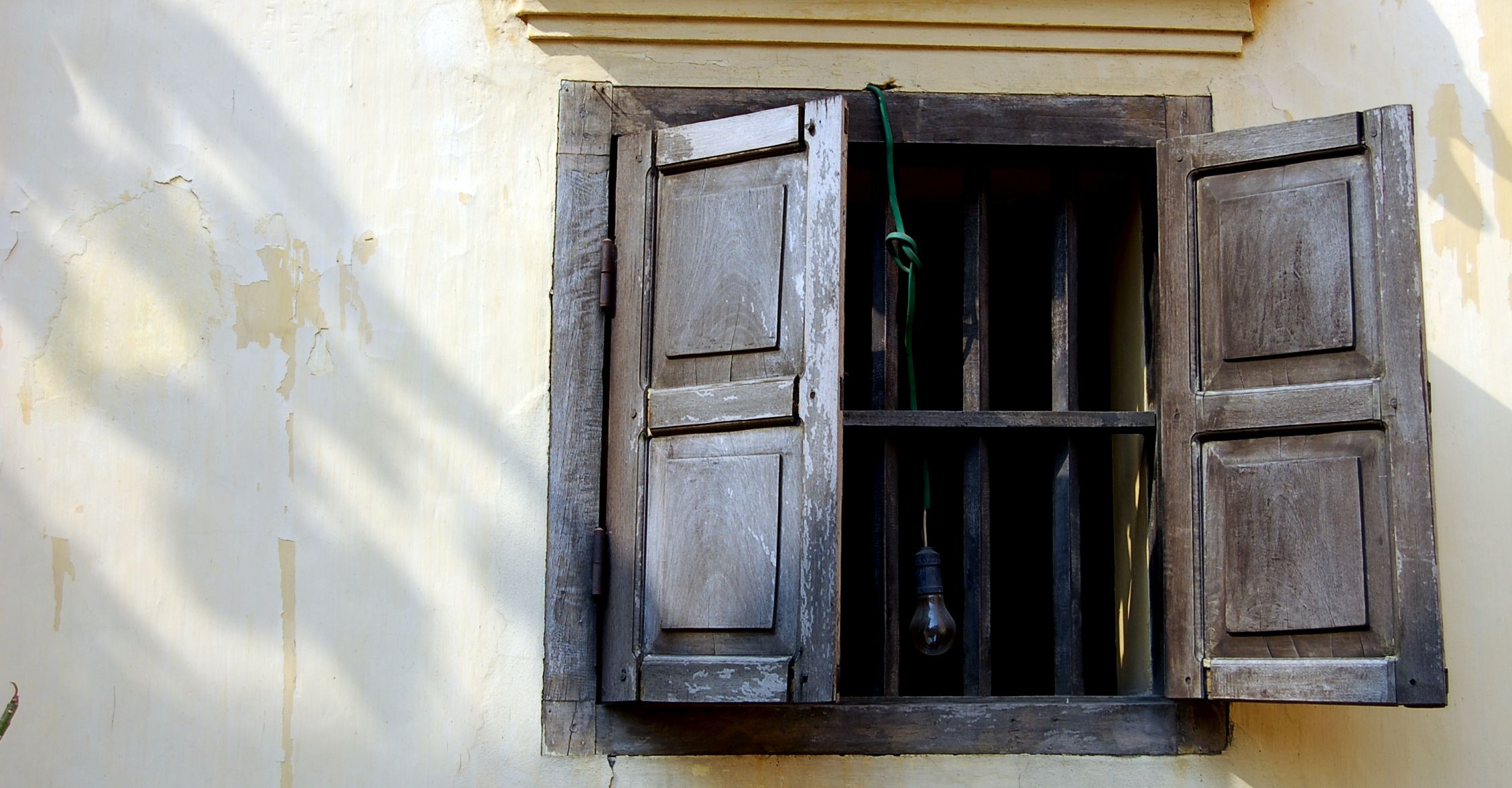“You can take this off now,” Tegan says, leaning over and tugging at Blue’s bow tie. She’s sitting cross-legged and she falls against him, one knee flipping up beneath her purple taffeta dress. “It’s so hot still, how can you even breathe.”
She looks at him and bites her bottom lip to stop a giggle that’s breaking across her face. It’s the tuxedo. They’d been laughing about it all night. The tux is baggy and made of a synthetic material that shines. The pants practically hiss with static.
“It was the last one for hire,” Blue says, feeling a pang of hurt about his terrible suit. He’d said the same thing hours earlier, the moment Tegan had opened her door to him standing with a corsage in his sticky hands, the sun low and bright in the sky.
Blue pulls down now at the purple cummerbund that has twisted around his body and crept up his chest. Dumb things, he thinks, dumb, dumb things. Tegan pulls off her heels, wiggles her toes and pushes her feet into the grass. She inspects a blister on the back of her foot, pressing at the loose skin, tempting it to give. She starts laughing.
“How about when Psycho Killer came on,” she says. “And you were dancing and your pants were all baggy. You looked so much like that guy in Talking Heads. So funny. Maria nearly pissed herself.”
Tegan rolls onto her back and stares at the sky. The night is clear and warm, the moon full and yellow like it’s a drawing in a children’s picture book. Tegan pulls at the grass and throws it into the air, but it’s so still it falls straight back down. She has polish on her nails, which makes her hands look different in a way Blue likes but also makes him feel lonely somehow, as if Tegan were already in the future.
“So what’s in the bag,” he says.
“Shit, that’s right.” Tegan sits up and puts a hand to her head. “Too many vodka jellies.”
They’re both drunk, Tegan a little and Blue a lot. Wine and beer at the end-of-school formal. Shots at the after-party. Beer again for Blue as they walked the quiet streets on their way here.
Tegan grabs the garbage bag she’s carried around since leaving the party. The bag she’d taken from the boot of a friend’s car, saying nothing to anyone about it, and slung over her shoulder with quiet determination. She holds the bag open for Blue. “Ta-da.”
Blue unclips his bow tie and looks in, a flutter of anxiety stirring low in his belly. Inside the bag are hundreds of flags on plastic poles, all jumbled up like a pile of coathangers. Tegan reaches in and grabs one and holds it in front of her face. The flag is white with a red peace symbol on it and the words — in a spray-paint black scrawl — “Stop the drop! Disarm now!”
“Tegan, what — ”
“C’mon,” she says, grabbing Blue’s arm and pulling him up. “I wanna remember this night for something — do something memorable before I leave.” She catches his eye but he looks away like he’s seen something in the distance.
“I’m just gonna sit here a minute,” he says, dropping back down. He pats at his suit jacket, one side and the other, up and down, and from an inside pocket pulls out a hip flask. “Jungle juice. From the party.” He holds the flask out to Tegan as he unscrews the top but she shakes her head and picks up the bag.
“Get up. The time has come, a fact’s a fact.” She’s sing-shouting a Midnight Oil song as she runs up the hill.
Blue takes a swig and looks around. It’s so quiet he can hear his own breathing and the beat of his heart. They’re on the lawns that run over the top of Parliament House in Canberra and yet Blue can’t see a soul in any direction. He wonders how the centre of politics in Australia can be so quiet. In the distance a car crosses Commonwealth Avenue Bridge, three lanes to itself.
Blue pushes himself up and follows after Tegan, his suit making a swishing sound as he moves. After a few steps he feels dizzy and stops. He looks up at the giant flagpole that towers over the building but his eyes can’t fix on it. The stars behind jump and spin. He crouches low, sweat suddenly beading on his forehead, and throws up.
“Tegan, I’m just … ” his voice trails off. He swallows heavily, the taste of prawn cocktail, vodka and bile stinging his throat. He drops to the ground and rolls from the spew. He stops a moment, then rolls some more. Parliament House has only been open a few months — everyone calls it New Parliament House — and the thing visitors like to do most is roll down the hill like a kid. Blue keeps rolling until he’s nearly at the bottom, where the grass joins a wide footpath.
Tegan doesn’t hear anything. She’s up the slope, arm deep in the bag, looking serious. Blue smiles to himself, thinking how it’s a protest of sorts throwing up where he has. Parliament House is built into Capital Hill. It’s like they cut the top off the hill, built a massive bunker and then plonked the hill back on top. So when you’re on the grass, you’re actually on top of the building. Or as Tegan likes to say, the politicians are beneath you. Blue has just vomited over the houses of parliament.
He lies back on the grass and looks down at his suit pants and the way the light of the moon illuminates specks in the cheap material. His pants are like a galaxy of stars. He can hear Tegan on the slope above him, the rustle of her dress, the dull fall of her feet as she jumps about. He closes his eyes and feels himself sinking.
*
Things had changed between Blue and Tegan on Australia Day, earlier that year. Before then they knew each other at school but didn’t talk apart from the occasional exchange in the history class they did together. Tegan was in the school band and did debating. Blue played rugby. They moved in circles that existed side by side but rarely overlapped.
But on January 26 they were both in Sydney and it was no ordinary Australia Day. It was 1988, the bicentenary year. The city sweated and heaved. Every spot with a view of the harbour was covered in bodies, and the smell of burning meat and beer and tan lotion thickened the summer air. Thousands of boats turned in small circles on water that shimmered like a mirage.
Away from the harbour, and away from the image Australia wanted to show the world, there was a protest for Aboriginal land rights, a march through the city that ended in Hyde Park.
Tegan stood in the park, holding a placard above her head and wearing a black T-shirt that had an outline of Australia on it and the word “Stolen” stamped in red. She looked around at the crowd — at the people she loved for rejecting this day as a celebration — and her eyes fell on a face she recognised. A face so unexpected in this place she did a double take. It was Nick Blueford from her history class. “Blue,” she said under her breath, just as his eyes looked up and found hers.
What Blue had not told Tegan that day or since was that he hadn’t planned to be at the protest. He’d spent the morning with his mum and little sister in a spot by the harbour, watching the tall ships come through the heads, a re-enactment of the First Fleet’s arrival two hundred years before. He had also spent an hour looking through binoculars, trying to find Princess Diana in the crowd in front of the Opera House.
But he’d grown bored and told his mum he was going for a walk. His mum said she wasn’t going anywhere, not when they had battled so hard for a spot. She said just be back by the fireworks. And so Blue had wandered off and into the life of Tegan Berryman.
In the months since, Blue and Tegan had been to half a dozen protests. And it wasn’t that Blue didn’t feel anything about all the causes Tegan was passionate about. But deep in his heart he knew he really just liked being with Tegan, wherever she was.
*
Blue wakes to the sound of movement, as if there’s a crack in the night’s stillness. He forgets where he is until he feels his suit jacket twisted and bunched beneath him, hipflask pressing against his side. He rolls onto his tummy and looks up the hill.
“Jesus.”
The top half of the lawn is covered in flags. Hundreds of them. More than seems possible. How long had he been asleep? The flags are spaced evenly and all point in the same direction. Row after row. Neat as a cross stitch. The scene is surprising and beautiful and for a moment he wonders if he’s dreaming. He pushes up on his elbows and is about to shout out when he sees the garbage bag halfway up the hill and a man standing over it, torchlight darting on the ground around him. The crackle of a walkie-talkie echoes in the silence.
Blue inches backwards on his tummy until he feels his feet touch the footpath. But there’s nowhere to hide and he watches the flashlight’s beam with a sense of inevitability. It runs over rows of flags, shoots up the hill, disappears into light from the top of the building, and then sweeps down over the grass and stops, shaky and blinding, right on him. The man shouts.
Blue jumps to his feet and runs. He moves fast. Even drunk and with his suit billowing out behind him, he has speed on his side. The rugby good for something. He moves like a winger for the corner. Air whistles in his ears and the sounds of shouting and footsteps and static grow fainter with each stride.
He runs about half a kilometre, until all he can hear is his own hard breathing. He bends over and puts his hands on his thighs, sucks in the air. Drops of sweat run down his face and his shirt sticks to the skin under his arms. He pulls off his jacket and shoves his face in it, wiping at the sweat. Liking the darkness. Deep in the material he can smell Tegan’s perfume.
“Blue!”
He keeps the jacket on his head. He thinks he’s hearing things, that the smell of Tegan’s perfume has conjured her voice in his mind.
“Blue,” comes the voice again. “Shit, Blue, I’m sorry.”
Blue brings his head out from under the jacket and spins around. He’s dizzy and it takes a moment for his eyes to focus. Then he sees that without thinking he has run from the new Parliament House to the old Parliament House, as if it were natural for his legs to bring him here. For him to run from the present to the past.
Tegan is sitting on the steps of the old building and Blue feels a familiar ache at how beautiful she looks. He immediately forgives her whatever she’s done. He walks over and drops down beside her.
“They’ve really let this building go to shit, hey,” he says, still breathless. The brickwork along the side of the steps has broken up and a few bricks sit loose on the top.
“This country isn’t interested in the past,” Tegan says.
Blue looks at Tegan’s feet, the red polish on her nails, the dust on her soles and between her toes. The blister has burst on her heel, leaving a smudge of dirty blood.
“I had to leave my shoes behind, I’m gonna be in such trouble,” Tegan says, turning her feet out and bringing them back again. “I panicked, Blue. I saw the guard and ran. I can’t get in trouble, not when I’m doing law. You can’t have shit on your record.”
Blue takes the hipflask from his pocket and shakes it. It sounds empty. He puts his lips to it anyway, tips his head back, and feels the last drops on his tongue. The taste gives him a sudden longing for the start of the night. For the first drink. For when it was still sunny outside and everyone was arriving and everything was ahead.
“Probably time I got used to you not being around anyway,” he says.
“Blue, it’s only Melbourne,” Tegan says. “We’re gonna talk every day. And I’ll come back at breaks. And in a year you’ll be there too.”
“I don’t know, Tegan,” he says slowly. “Does anyone who has to repeat Year 12 ever end up at uni? I reckon I’m more likely to end up a security guard like the one I just ran from.”
Tegan puts an arm around him. “You’re smart, Blue. Don’t put yourself down. Your dad was sick. It wasn’t the year for you. Next year will be different.”
Blue has heard this story before and he’s told it himself a few times. He tries to believe it. He leans back on the steps, stretches his legs out, and looks at the faint line of light on the horizon. Champagne and chicken breakfast be starting at Regatta Point soon. He puts the jacket on his head again. The night goes on forever under the jacket.
“Hey Blue, guess who I am,” Tegan says and Blue hears her stand up. “Well may you say ‘God Save the Queen’,” her voice deep and breathy. “Because nothing will save the Governor-General.”
It’s a pretty good impression and Blue laughs from beneath the jacket. The laughing feels good and he’s keen to keep it going. He brings his head out, ready to do his own impression of Gough Whitlam and the words he spoke on this spot.
But Tegan sits down on the steps and is suddenly serious. She says Whitlam was the greatest prime minister ever and that Australia hasn’t recovered from his sacking. “It’s a festering wound on the nation’s psyche.”
Blue can imagine her saying this in a tutorial or at the uni bar. He can picture others around her, serious and attractive, nodding, saying similar things. How do some people know this stuff, he wonders. Why can’t he say things like this? When did they learn it?
Tegan is on her feet again and waving her arms about like she’s practising a closing argument for a school debate. She says Britain and America didn’t want Australia turning socialist, so they made sure it didn’t happen.
“John Kerr and the Queen and the Establishment and probably the bloody CIA crushed the will of the people, Blue. They crushed it like it was a fly hovering over one of those cucumber sandwiches cut into neat quarters.”
Blue thinks he hears something beneath the sound of Tegan’s voice. He stands up, letting his jacket drop to the ground, and walks over to the edge of the steps. From there he can see a car sits idling on the small road that runs down the side of the building. It looks like a security patrol.
“Hey Blue, where have you gone,” Tegan shouts. “Come back. I haven’t finished telling you all the reasons this country’s fucked.”
“Yeah, coming,” Blue says. He tries to make out a face behind the wheel but the car is too far away and the windscreen is dark. We’re allowed to be here, he thinks, and gives a little wave. He thinks of giving the finger. He drops his arm and his hand falls on a loose brick at the edge of the steps.
The car starts moving. It travels slowly and takes a left turn towards them. Blue looks at Tegan. She is staring ahead with her chin resting on her fist like she’s thinking about something important. Thinking about protest and the law and university. She already seems far away from him. He looks back at the car, picks up a brick, turns and throws it at the old building. The brick catches the corner of a dark office window. A shattering of glass rips through the night.
“Run!” Blue shouts. “Run.”
Tegan is on her feet. She turns to Blue as an alarm starts screeching. They stare at each other a long moment across the steps. It makes Blue think of when they saw each other in the crowd at the Australia Day protest, swirls of smoke in the air between them.
Tegan hears the car approaching and spins around. She looks back at Blue and then starts running, her bare feet slapping dully on the concrete.
Blue drops back down on the steps. He watches Tegan run down the wide, empty street, her body coming in and out of light from the overhead streetlamps. He watches until she disappears into the grey of a new day.
The guard is coming up the steps and Blue is ready to take whatever’s coming. But he’s also thinking about Tegan’s shoes. How they’re sitting on the hill above the parliament. And how as soon as he can he’s going to fight to get them back.



